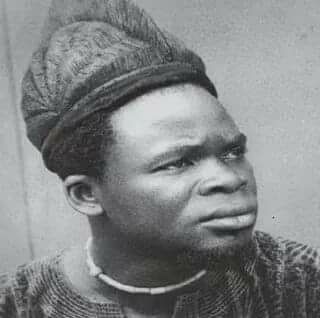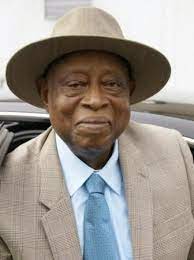Lere Paimo | |
|---|---|
| Born | 19 November 1939 |
| Other names | Eda Onile Ola |
| Occupations |
|
| Years active | 1958–present |
| Awards | MFR |
Lere Paimo ![]() Listen , OFR (born 19 November 1939) is a Nigerian film actor, film maker, producer and director. [1]
Listen , OFR (born 19 November 1939) is a Nigerian film actor, film maker, producer and director. [1]
Lere Paimo | |
|---|---|
| Born | 19 November 1939 |
| Other names | Eda Onile Ola |
| Occupations |
|
| Years active | 1958–present |
| Awards | MFR |
Lere Paimo ![]() Listen , OFR (born 19 November 1939) is a Nigerian film actor, film maker, producer and director. [1]
Listen , OFR (born 19 November 1939) is a Nigerian film actor, film maker, producer and director. [1]
Chief Lere Paimo, MFR was born on November 19, 1939 in Ile Ikoyi Odan, Osupa, Ogbomosho, a city in Oyo State southwestern Nigeria. [2] His father was a tobacco and yam farmer, the leader of the local farmers’ organization. His mother was a trader. Chief Lere Paimo was sent to primary school in Ogbomoso, but then left for the Gold Coast where he continued his education in the Gold Coast ( current day Ghana) up to teacher training college where he obtained Teacher’s Grade two certificate. He eventually returned back to Nigeria and decided to stay in Osogbo where he worked as a class-room teacher in a Baptist Missionary School,
He began acting in 1958 after he joined the Oyin Adejobi theatre group, a theatre group founded by Pa Oyinade Adejobi before he later joined Duro Ladipo's Theatre Group where he featured in a stage play titled Obamoro with the role of "Chief B asa". [3] He became popular following a lead role as Soun Ogunola played in an epic yoruba film t Thtled Ogbori Elemosho which brought him into limelight. He had featured, produced and directed several Nigerian films since he began acting in 1963. [4] In 2005, in recognition of his im In around 1960, while working as a teacher in Osogbo, he decided to join Oyin Adejobi theatre group, a theatre group founded by Pa Oyinade Adejobi which was an organization performing plays for churches, schools, and cultural and social clubs. A year later in about 1961, Duro Ladipo invited him to Mbari Club, the cultural centre founded by Ulli Beier to take part in an art production. He was interested in painting as well as in theatre, so he accepted the invitation.
From the beginning, Lere Paimo’s talent as an actor was recognized and he was given leading roles. In Eda, a Yoruba version of Ev he played Everyman himself, so memorably that up till today his nickname has remained Eda Onile ola. While with Duro Ladipo, he featured in a stage play titled Obamoro with the role of "Chief Basa". eryman,mense contributions to the Nigerian film industry, he was bestowed a National award of Member of the Federal Republic alongside Zeb Ejiro by Olusegun Obasanjo the former President of the Federal Republic of Nigeria. [5] [6] In May 2013, it was reported that he had a partial stroke, an attack he survived. [7] In April 2014, he won N1m cash prize in a Nigerian game show, Who Wants to be a MIllionaire. [8]
Osogbo is a town in Nigeria. It became the capital city of Osun State in 1991. Osogbo city seats the Headquarters of both Osogbo Local Government Area and Olorunda Local Government Area. It is some 88 kilometers by road northeast of Ibadan. It is also 108 kilometres (67 mi) by road south of Ilorin and 108 kilometres (67 mi) northwest of Akure. Osogbo shares boundaries with Ikirun, Ilesa, Ede, Egbedore, Ogbomosho and Iragbiji and it is easily accessible from any part of the state because of its central nature. It is about 48 km from Ife, 32 km from Ilesa, 46 km from Iwo, 48 km from Ikire and 46 km from Ila-Orangun; The city had a population of about 500,000 people and an approximate land area of 2875 km2 the postal code of the area is 230.

Osun State, occasionally known as the State of Osun by the state government, is a state in southwestern Nigeria; bounded to the east by Ekiti and Ondo states, to the north by Kwara State, to the south by Ogun State and to the west by Oyo State. Named for the River Osun—a vital river which flows through the state—the state was formed from the southeast of Oyo State on 27 August 1991 and has its capital as the city of Osogbo.
Chief Oyin AdejobiListen (1926–2000) was a Nigerian dramatist and actor. His name, Oyin, means "Honey". He wrote and performed in a variety of Yoruba productions on the stage, on television and in movies. He was married to actress Grace Oyin-Adejobi until his death.

Durodola Durosomo Duroorike Timothy Adisa Ladipo, more commonly known as Duro Ladipo, was one of the best known and critically acclaimed Yoruba dramatists who emerged from postcolonial Africa. Writing solely in the Yoruba language, he captivated the symbolic spirit of Yoruba mythologies in his plays, which were later adapted to other media such as photography, television and cinema. His most famous play, Ọba kò so, a dramatization of the traditional Yoruba story of how Ṣango became the Orisha of Thunder, received international acclaim at the first Commonwealth Arts Festival in 1965 and on a Europe an tour, where a Berlin critic, Ulli Beier, compared Ladipọ to Karajan. Ladipo usually acted in his own plays.

Moses OlaiyaListen, better known by his stage name "Baba Sala", was a Nigerian comedian, dramatist, and actor.
Ọlátúbọ̀sún Oládàpọ̀, also known as Túbọ́sún Ọládàpọ̀, or Odídẹrẹ́ Ayékòótọ́, is a Yoruba-language folk poet, playwright, music producer, radio personality/broadcaster, writer, and researcher from Nigeria whose audience speak Yorùbá and reside chiefly in South-West Nigeria.
Ọba kò so is a play by Duro Ladipo depicting the mystical and ambivalent personality known as Shango of Yoruba mythology.
Chief Jimoh Buraimoh is a Nigerian painter and artist. Chief Buraimoh is one of the most influential artists to emerge from the 1960s workshops conducted by Ulli Beier and Georgina Beier in Osogbo, Osun State, Nigeria. Since then, he has become one of the best known artists from Osogbo.
Ola Balogun is a Nigerian filmmaker and scriptwriter. He also ventured into the Nigerian music industry in 2001. Balogun, who has been making films for more than three decades, is part of the first generation of Nigerian filmmakers.
Bakare Gbadamosi is a Yoruba poet, anthropologist and short story writer from Nigeria.

Adebayo SalamiListen popularly known by his stage name Oga Bello(Listen), is a veteran Nigerian actor, filmmaker, film producer, and director.
Kola OyewoListen is a Nigerian veteran actor, dramatist, and scholar.
Zeb Ejiro, MFR is a Nigerian filmmaker and producer. He is one of the two brothers of Chico Ejiro, a veteran Nigerian filmmaker and producer.

Filmmaking in Colonial Nigeria generally refers to an era in Nigerian cinema, usually spanning the 1900s through to the 1950s, when film production and exhibition or distribution were controlled by the British colonial Government. The history of cinema in Nigeria dates back to as early as the history of film itself; notably in the late 19th century, with the use of peephole viewing of motion picture devices. These were soon replaced in the early 20th century with improved motion picture exhibition devices, with the first set of films screened at the Glover Memorial Hall in Lagos from 12 to 22 August 1903.

Golden Age or Golden era are terms used in Nigerian film history to designate the motion picture industry of Nigeria from the late 1950s to the late 1980s. It captures the mode of visual and sound production, as well as the method of distribution employed during this period. This period began with the formal recognition of the Nigerian Film Unit as a sector in 1954, with the first film entirely copyrighted to this unit being Fincho (1957) by Sam Zebba.

Ti Oluwa Ni Ile is a Nollywood Yoruba drama film sequel directed by Tunde Kelani. Released in 1993 through Mainframe Films and Television Productions, the film was Tunde Kelani's debut film as a film director. It was made in 3 parts and listed as one of the 10 best selling Yoruba movies.
Chief Abiola Dosunmu, is a Nigerian businesswoman, socialite and traditional aristocrat. In addition to a variety of other chieftaincy titles, she currently holds that of the Erelu Kuti IV of Lagos.
Abiodun Duro-Ladipopronunciation is a Nigerian actress and singer of noble Yoruba birth. In 1963, she joined the theatre company of Duro Ladipo, whom she married the following year. Acting in her husband's epic plays, she was particularly successful in the role of Oya in Oba Koso and in the title role of Moremi. In the 1960s and early 1970s, she appeared across Europe at several international festivals. Since her husband's death in 1978, Abiodun has appeared in Nigerian television series and in films promoting African culture, once again playing Moremi in the 2009 film of the same name.
Ifáyẹmi Ọ̀ṣundàgbónu Elebuibon is a Yoruba and Nigerian writer, poet, author, linguist, and a world-famous Ifa priest. His plays and films have received worldwide acclamation for his pursuit of the preservation of Yoruba culture and heritage. He also serves as a traveling lecturer in several institutions including at the department of African language and literature at the Obafemi Awolowo University and Black Studies at the San Francisco State University and at the Wajumbe Cultural Institution in California.
Chief Muraina Oyelami is a Nigerian painter and drummer of Yoruba descent. He was among the first generation of artists to come out of the Osogbo School of Art in the 1960s. He was a drummer and actor with the theatre company of Duro Ladipo. He taught traditional music and dance at Obafemi Awolowo University from 1976 to 1987. As a musician, he trained in the dùndún and the Batá drum. He was the chief of his hometown Iragbiji.